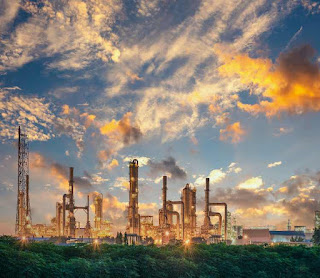What is the Oil Refinery and What is process of oil refining
An oil refinery, also known as a petroleum refinery, is an industrial facility that processes crude oil into different useful products. The crude oil that is refined in the refinery is a complex mixture of hydrocarbons, including alkanes, cycloalkanes, and aromatic hydrocarbons, as well as small amounts of sulfur, nitrogen, and oxygen compounds. The refining process separates these different hydrocarbons and other compounds into various useful products, such as gasoline, diesel, jet fuel, lubricants, and chemicals.
The refining process can be divided into four main stages: separation, conversion, treatment, and blending. Each stage involves various processes and equipment that work together to transform the crude oil into different products.
1. Separation
The first stage of the refining process is separation, where the crude oil is separated into different fractions based on their boiling points. This is done in a distillation tower, also known as a crude unit. The crude oil is heated to high temperatures and fed into the bottom of the distillation tower. As the crude oil rises up the tower, it cools and condenses into different fractions, with the lighter fractions condensing at the top of the tower and the heavier fractions condensing at the bottom.
The different fractions that are produced in the distillation tower include:
Light gases: These are the lightest fractions and include methane, ethane, propane, and butane, which are used for heating and cooking.
Naphtha: This fraction is used to produce gasoline, as well as petrochemicals such as plastics and synthetic fibers.
Kerosene: This fraction is used to produce jet fuel, as well as diesel fuel.
Gas oil: This fraction is used to produce diesel fuel, as well as heating oil.
Residuum: This is the heaviest fraction and is used to produce lubricating oils and bitumen.
2. Conversion
The second stage of the refining process is conversion, where the different fractions produced in the distillation tower are converted into more useful products. There are various conversion processes, including:
Cracking: This is a process where the larger hydrocarbon molecules are broken down into smaller molecules. There are two types of cracking: thermal cracking, which uses heat and pressure to break down the molecules, and catalytic cracking, which uses a catalyst to speed up the reaction. Cracking is used to produce gasoline, diesel fuel, and other products.
Reforming: This is a process where the hydrocarbon molecules are rearranged to produce higher-quality products, such as gasoline and petrochemicals.
Isomerization: This is a process where the molecules are rearranged to produce isomers, which have the same chemical formula but different structures. Isomerization is used to produce high-octane gasoline.
Alkylation: This is a process where two or more smaller molecules are combined to produce larger molecules. Alkylation is used to produce gasoline and other products.
3. Treatment
The third stage of the refining process is treatment, where the different products are treated to remove impurities and improve their quality. There are various treatment processes, including:
Desulfurization: This is a process where sulfur compounds are removed from the products, as sulfur can cause pollution and damage to engines.
Hydrogenation: This is a process where hydrogen is added to the products to improve their quality, such as increasing their stability and reducing their viscosity.
Hydrotreating: This is a process where the products are treated with hydrogen to remove impurities, such as sulfur and nitrogen compounds.
4. Blending
The final stage of the refining process is blending, where the different products are blended together to produce the final products, such as gasoline, diesel fuel, and lubricants. The






Comments
Post a Comment